- Home
- Medical news & Guidelines
- Anesthesiology
- Cardiology and CTVS
- Critical Care
- Dentistry
- Dermatology
- Diabetes and Endocrinology
- ENT
- Gastroenterology
- Medicine
- Nephrology
- Neurology
- Obstretics-Gynaecology
- Oncology
- Ophthalmology
- Orthopaedics
- Pediatrics-Neonatology
- Psychiatry
- Pulmonology
- Radiology
- Surgery
- Urology
- Laboratory Medicine
- Diet
- Nursing
- Paramedical
- Physiotherapy
- Health news
- Fact Check
- Bone Health Fact Check
- Brain Health Fact Check
- Cancer Related Fact Check
- Child Care Fact Check
- Dental and oral health fact check
- Diabetes and metabolic health fact check
- Diet and Nutrition Fact Check
- Eye and ENT Care Fact Check
- Fitness fact check
- Gut health fact check
- Heart health fact check
- Kidney health fact check
- Medical education fact check
- Men's health fact check
- Respiratory fact check
- Skin and hair care fact check
- Vaccine and Immunization fact check
- Women's health fact check
- AYUSH
- State News
- Andaman and Nicobar Islands
- Andhra Pradesh
- Arunachal Pradesh
- Assam
- Bihar
- Chandigarh
- Chattisgarh
- Dadra and Nagar Haveli
- Daman and Diu
- Delhi
- Goa
- Gujarat
- Haryana
- Himachal Pradesh
- Jammu & Kashmir
- Jharkhand
- Karnataka
- Kerala
- Ladakh
- Lakshadweep
- Madhya Pradesh
- Maharashtra
- Manipur
- Meghalaya
- Mizoram
- Nagaland
- Odisha
- Puducherry
- Punjab
- Rajasthan
- Sikkim
- Tamil Nadu
- Telangana
- Tripura
- Uttar Pradesh
- Uttrakhand
- West Bengal
- Medical Education
- Industry
FIT after negative colonoscopy may reduce risk of colorectal cancer: Study

Subsequent faecal immunochemical test (FIT) should be scheduled after negative colonoscopy to detect missed neoplasms, thereby reducing the risk of incidence of colorectal cancer (CRC), finds a recent study as published in The Gut Journal.
Subjects with a positive faecal immunochemical test (FIT) have a much higher likelihood of advanced neoplasms than the general population. Whether FIT-positive subjects with negative colonoscopy should receive subsequent FIT screening remain unclear.
Hence, Szu-Min Peng and associates from the Division of Biostatistics, College of Public Health, National Taiwan University, Taipei, Taiwan recently carried out a cohort study, which comprised of 9179 subjects who had negative diagnostic colonoscopy after positive FIT, of whom 6195 received subsequent FIT during the study period.
Subjects with a negative colonoscopy after positive FIT in the first screening in the Taiwanese Colorectal Cancer (CRC) Screening Program were followed up. CRC incidence was compared between those who did and did not receive subsequent FIT screening.
Cox regression analysis was conducted, adjusting for major confounders to investigate whether subsequent FIT was associated with lower risk of incident CRC.
The study revealed that the CRC incidence (per 1000 person years) was 1.34 in those who received subsequent FIT and 2.69 in those who did not, with corresponding adjusted HR (aHR) of 0.47 (95% CI 0.31 to 0.71). Lower adenoma detection rate of diagnostic colonoscopy was associated with higher risk of incident CRC but became non-significant in multivariable analysis after adjustment for subsequent FIT.
Higher baseline faecal haemoglobin concentration (FHbC, μg haemoglobin/g faeces) was associated with increased risk of incident CRC, 0.95, 2.26 and 2.44 for FHbC=40–59, 60–99, 100–149 and ≥150, respectively.
As a results, the authors concluded that "subsequent FIT should be scheduled after negative colonoscopy to detect missed neoplasms and reduce the risk of incident CRC in a national FIT screening programme."
Dr. Nandita Mohan is a practicing pediatric dentist with more than 5 years of clinical work experience. Along with this, she is equally interested in keeping herself up to date about the latest developments in the field of medicine and dentistry which is the driving force for her to be in association with Medical Dialogues. She also has her name attached with many publications; both national and international. She has pursued her BDS from Rajiv Gandhi University of Health Sciences, Bangalore and later went to enter her dream specialty (MDS) in the Department of Pedodontics and Preventive Dentistry from Pt. B.D. Sharma University of Health Sciences. Through all the years of experience, her core interest in learning something new has never stopped. She can be contacted at editorial@medicaldialogues.in. Contact no. 011-43720751
Dr Kamal Kant Kohli-MBBS, DTCD- a chest specialist with more than 30 years of practice and a flair for writing clinical articles, Dr Kamal Kant Kohli joined Medical Dialogues as a Chief Editor of Medical News. Besides writing articles, as an editor, he proofreads and verifies all the medical content published on Medical Dialogues including those coming from journals, studies,medical conferences,guidelines etc. Email: drkohli@medicaldialogues.in. Contact no. 011-43720751


